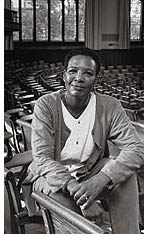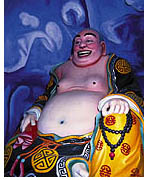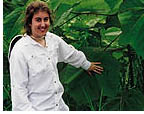 It has been three decades since Princeton created a program in African-American
Studies, and history professor Nell Painter is reflecting on what has been
accomplished.
It has been three decades since Princeton created a program in African-American
Studies, and history professor Nell Painter is reflecting on what has been
accomplished.
Notebook - April 18, 2000
Widening the web of learning
Princeton, Yale, and Stanford plan joint online courses
Who knows where the future of higher education lies? Some say it will be on the Internet; others insist that, no, it will remain firmly on land with residential systems. Princeton, with one of the most beautiful of residential sites, recently allied with Yale and Stanford Universities to create what could be the beginning of an entirely new way of learning. The three universities are in the midst of developing online courses, at the moment for alumni only.
According to Georgia Nugent '73, associate provost and the person in charge of Princeton's involvement, the idea arose out of conversations between the presidents of the various institutions.
"Technology will change the ways of delivering education. You could say that we're experimenting and learning how to use that medium well," Nugent said.
She hopes that the first courses, which will be in the area of liberal arts, will be available this fall. "The courses will be open to all alumni from all three schools. There will be no credit and no degree given. The courses will likely take the form of two to four lectures, not an entire semester's program," she said.
Depending on the curriculum, the courses will be interactive in varying degrees; some will be delivered via multimedia, others will offer interactions with a database, and some might have online discussions similar to precepts.
Princeton already offers four courses online for its alumni, including the two-part Demonization of the Other by professor of Near Eastern studies Norman Itzkowitz and Walks in Rome by professor of art and archaeology John Pinto. More than 850 people enrolled in Pinto's course.
There are several reasons to hook up with peer institutions. "Developing courses online is expensive and also time-consuming," said Nugent, "and creating material is difficult. Working together we can share the costs and the risks, and provide a much richer curriculum."
Alumni who enroll will not have to sign away their particular allegiances to tigers, bulldogs, or the color cardinal, but will have to pay a fee, as yet undetermined.
Princeton professors who agree to develop materials for the online courses will receive additional salary, probably equivalent to what Nugent called "summer salary," since professors are paid on a 10-month basis. They also can use any new material in their own classes during the academic year.
Behind the academic materials and the professors will be a cadre of programmers and graphic designers who will work with the professors to develop and maintain the components of the courses. At Princeton, the Multimedia Engineering Computation Atelier (MECA) has played a leading role in this area, said Nugent. Housed in the engineering school, "it will become the heart of this new service for faculty."
On whose computer system the joint courses will be located-and with the Inter-net they could be located almost anywhere-is yet to be decided. "We expect, though," said Nugent, "there will be a big back-office operation." In other words, once the faculty involvement is finished, others will administer the course delivery, help alumni troubleshoot, and offer marketing expertise and user support.
Nugent is thrilled to be leading Princeton's part of the project. "This is the most exciting thing I've worked on," she said. "It's like gazing into a crystal ball." -L.O.
Wellesley's Taylor appointed director of art museum
After a two-year search, the university has found a director for the Art Museum. Susan Taylor, director of the Davis Museum and Cultural Center at Wellesley College, will come to Princeton in August and succeed Professor Peter Bunnell, who has served as acting director since the retirement of Director, Emeritus, Allen Rosenbaum in 1998.
At Wellesley, Taylor oversees all areas of acquisitions, exhibitions, and programs for the museum and has a particular interest in contemporary art. She has lectured and consulted on new museum architecture and design, issues in public art, and architect and artist collaborations. At Wellesley she teaches a course on museum issues and will likely teach a similar course at Princeton in the art and archaeology department.
Before going to Wellesley, Taylor served at the Guggenheim Museum in New York, where she coordinated several major national and international exhibitions. She received her B.A. in Medieval and Renaissance Studies from Vassar College and her M.A. from the Institute of Fine Arts at New York University.
In a statement, President Shapiro said, "Under her leadership, I
believe we will see exciting new things happening at the museum, particularly
in programming and in the development of new relationships with students,
faculty, and alumni, as well as with the museum's other constituencies beyond
the campus." n
African-American Studies hits midlife
Questions arise about its status
 It has been three decades since Princeton created a program in African-American
Studies, and history professor Nell Painter is reflecting on what has been
accomplished.
It has been three decades since Princeton created a program in African-American
Studies, and history professor Nell Painter is reflecting on what has been
accomplished.
"Some people just don't realize that this field is 30 years old and that it has grown tremendously in that time," says Painter, the program's director. "African-American studies is an intellectual undertaking. We have a field that has a gigantic literature. This is not just something that you do in your spare time."
To mark its anniversary, the program invited Julian Bond, civil rights activist and chair of the NAACP, to speak. His talk, titled "2000: A Race Odyssey," took place last month and came at a crucial time for the program, which has had to deal not only with the loss of high-profile faculty members such as Cornel West *80 to Harvard University in 1994 and Arnold Rampersad to Stanford last year, but also a decline in enrollment.
Last year the program awarded 17 undergraduate certificates and now draws about 100 students each semester-far fewer than when West taught at Princeton-but faculty members say the quality of students and the vitality of scholarship are undiminished. U.S. News and World Report ranks Princeton third among the nation's graduate programs for African-American history and fourth for African-American literature.
Faculty members, who number four, and administrators say they are committed to making the program even stronger, and they have begun a series of initiatives to accomplish that. Within the last year, the program has expanded its offering of conferences, drawn new scholars, and worked to expand its presence on campus. Meanwhile, the university is in the midst of an intensive faculty recruitment process for both junior and senior faculty members.
"I think there is no university initiative under way now that is more important than recruiting efforts for the Program in African-American Studies," said Provost Jeremiah Ostriker. The trustees, he added, are extremely supportive of the effort.
The question of whether African-American Studies should be an interdisciplinary program or a department itself remains open. As a program, African-American Studies grants undergraduate certificates but does not grant degrees. Its faculty members are jointly hired by departments and split their time with African-American Studies.
Painter, among others, believes the program could achieve more with departmental status. In her view, it would make it easier to recruit top faculty members and graduate students who specialize in African-Ameri-can or interdisciplinary studies. She also feels that departmental status would provide a more stable core of faculty members, which would fill gaps among course offerings.
But the issue is not clear-cut. Some candidates for faculty positions view themselves primarily as scholars of history, religion, or English and might be reluctant to accept a post solely in an African-American studies department, Ostriker said.
At most universities African-American studies have program status, as at Princeton. However, according to a report to be published this spring in the Journal of Blacks in Higher Education, seven of the 28 universities ranked highest by U.S. News and World Report now have African-American Studies departments. That includes Harvard and Yale Universities (Yale announced the switch from program to department this past February). n
-Marilyn Marks
This article was adapted from one that appeared in the Princeton Weekly Bulletin.
The University Press Club is celebrating its centennial this year, not by chomping on cigars and throwing around bits of ticker tape, but very sedately at a brunch during Reunions on May 27. President Anne Ruderman '01 said that a number of former Press Club members will speak, and there will be a display of Press Club memorabilia and a booklet featuring old clips and letters.
Reporting on the founding of the club, the paw of April 21, 1900, wrote: "Realizing the need of a protective policy, the students who are correspondents of the daily papers throughout the country met recently and organized the Princeton University Press Club. . . . The object . . . is to promote the proper publication of authentic news which will be of benefit to Princeton and most of all to prevent the circulation of news which would be detrimental to the interests of the university."
Prominent Press Club alumni include David Lawrence '10, founder of U.S.
News and World Report; Alan Blinder '67, professor of economics at Princeton;
Mike McCurry '76, former press secretary to President Clinton; David Remnick
'81, editor of The New Yorker; Wendy Kopp '89, founder of Teach for America;
and myriad reporters and writers around the country, including Marc Fisher
'80 and Todd Purdum '82. n
paw asked three members of the religion department to let us know
what they're working on.
In my current book project, titled Diet, Discipline, and Devotion: Christianity and the Body in American Culture, I explore the evolution of fasting and dieting in the 20th century, focusing on their relationship to religion and to notions of virtue, purity, and beauty. My research suggests that religion has played a powerful role in the body obsessions of our own time, even those that we now think of as entirely secular.
-Marie Griffith
associate director of the Center for the Study of Religion and lecturer in religion
My current research involves the way the purity laws of Leviticus 12-15 are treated in sources from the Second Temple period, particularly the Dead Sea Scrolls. I'm interested in the way the laws are elaborated so that they have a greater impact on the lives of ordinary people, not just priests and their families. I'm also interested in the question of whether impurity comes to be associated with sin in these texts, as many people have argued, and I think that on the whole the categories of impurity (ritual) and sin (morality) remain quite distinct.
-Martha Himmelfarb
professor of religion
 My current research examines how common people in medieval China viewed
the afterlife. That's not a straightforward task, since most of the records
about Chinese Buddhism left to us were written by decidedly uncommon people:
government officials, poets and other writers, and Buddhist monks. I've
been reading prayers and commentaries written by a wide range of people
that by chance survive in manuscript form; they are part of the 50,000 or
so documents sealed up in a cave on the edge of the Taklamakan Desert in
Chinese Turkestan in the 11th century and unearthed (and pilfered) by Chinese
scholars and European adventurers early in this century. I also use evidence
from painting, sculpture, and archaeological remains.
My current research examines how common people in medieval China viewed
the afterlife. That's not a straightforward task, since most of the records
about Chinese Buddhism left to us were written by decidedly uncommon people:
government officials, poets and other writers, and Buddhist monks. I've
been reading prayers and commentaries written by a wide range of people
that by chance survive in manuscript form; they are part of the 50,000 or
so documents sealed up in a cave on the edge of the Taklamakan Desert in
Chinese Turkestan in the 11th century and unearthed (and pilfered) by Chinese
scholars and European adventurers early in this century. I also use evidence
from painting, sculpture, and archaeological remains.
I've also been directing a new forum at Princeton for the interdisciplinary study of Buddhism. The Buddhist Studies Workshop draws together faculty and graduate students from a variety of departments (anthropology, art and archaeology, comparative literature, East Asian studies, history, religion) for monthly discussion of papers by visiting scholars. Our theme for this year is ethnicity and national identity. The format allows us to look at topics not otherwise part of Princeton's curriculum, such as Buddhism and race in America and religion in South Asia. n
-Stephen Teiser
professor of religion
 Lil Wood '00 won the Martin A. Dale '53 Fellowship, which will give
her $20,000 and allow her to work on a book about women who fish for a living.
Wood, who grew up in Alaska and worked in fish canneries during the summers,
plans to travel the coastlines and weave her research into a book of creative
nonfiction. Wood is majoring in ecology and evolutionary biology.
Lil Wood '00 won the Martin A. Dale '53 Fellowship, which will give
her $20,000 and allow her to work on a book about women who fish for a living.
Wood, who grew up in Alaska and worked in fish canneries during the summers,
plans to travel the coastlines and weave her research into a book of creative
nonfiction. Wood is majoring in ecology and evolutionary biology.
Peter Pentchev '01 was indicted January 26 by a federal grand jury for allegedly hacking into the computer systems at an e-commerce company in Palo Alto, California, during a one- month period in late 1998, and stealing 1,800 credit card numbers, user names, and passwords, and causing $5,000 in damages to the company, according to a statement released by the U.S. Department of Justice. The whereabouts of Pentchev, a Bulgarian, are not known, but it is thought that he fled the country in December 1998. The Daily Princetonian quotes one of Pentchev's former roommates, Adam Pribula '00, as saying, "He disappeared off the face of the planet." As of press time, Pentchev was still at large.
Professor of philosophy Harry G. Frankfurt was named the Romanell-Phi Beta Kappa Professor for 1999-2000, an honor that recognizes distinguished achievement and potential contributions to public understanding of philosophy. And to promote public understanding, Frankfurt last month delivered three lectures on the theme "Some Thoughts about Norms, Love, and the Goals of Life." A professor at Princeton since 1990, Frankfurt has spent much of his career exploring the ways in which people think about themselves intellectually and morally, and how ideals and values shape lives.
Professor of English Michael Goldman '60 *62 received in February the George Jean Nathan Award for Dramatic Criticism for his book Ibsen: The Dramaturgy of Fear (Columbia University Press, 1999). The Nathan Award, which is worth $10,000, is given annually for the best piece of dramatic criticism in an article, essay, treatise, or book. The winner is chosen by a committee comprising the chairs of the English departments at Cornell, Princeton, and Yale.
Suzanne Keller, a professor of sociology, received the MERIT Award of the Eastern Sociological Society for "outstanding contributions to the discipline."
 If you don't know much about Princeton's graduate school, help is available
from a new little book called, unsurprisingly, Princeton University's Graduate
College. Written by David R. Coffin, professor, emeritus, of the history
of architecture, the book takes the reader from the school's founding in
1900 through the 10 decades of its growth and development. Published in
celebration of the graduate school's centennial, the book is available from
the University Store.
If you don't know much about Princeton's graduate school, help is available
from a new little book called, unsurprisingly, Princeton University's Graduate
College. Written by David R. Coffin, professor, emeritus, of the history
of architecture, the book takes the reader from the school's founding in
1900 through the 10 decades of its growth and development. Published in
celebration of the graduate school's centennial, the book is available from
the University Store.
Items for Notebook should be sent to Lolly O'Brien, lolly@princeton.edu.
GO TO the Table of Contents of the current issue
GO TO
PAW's home page